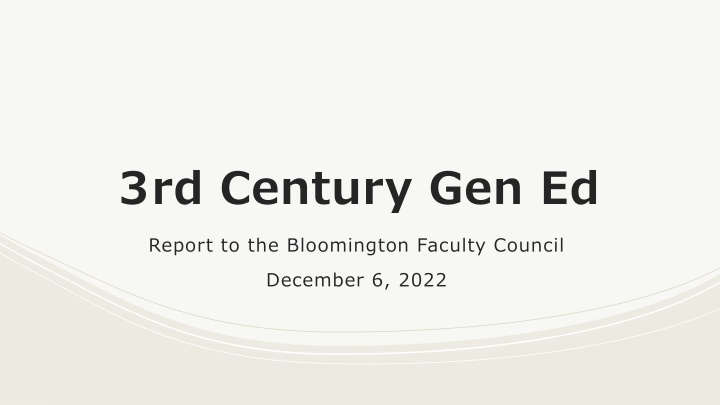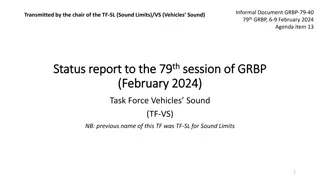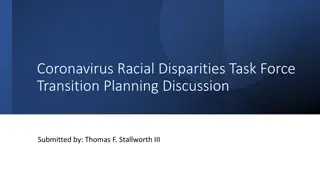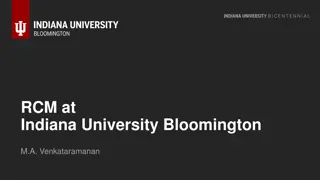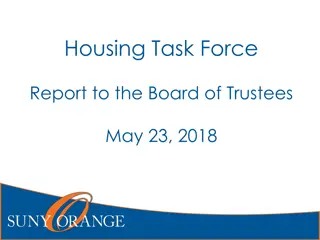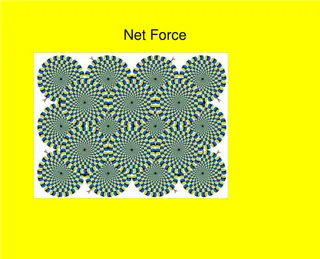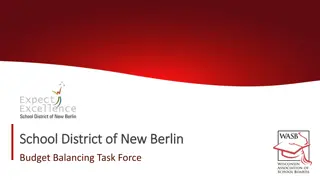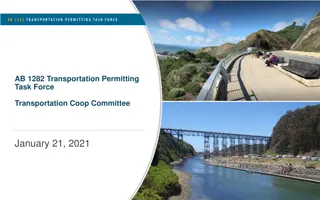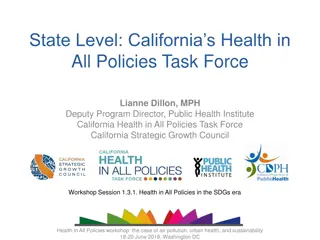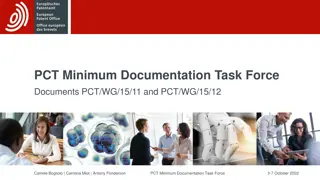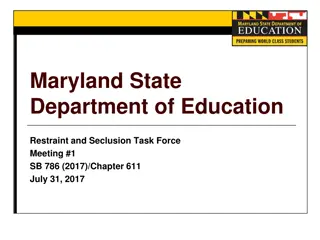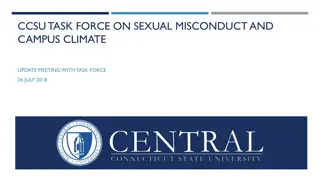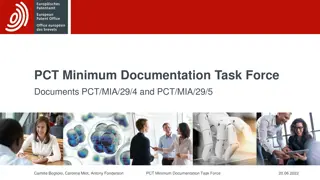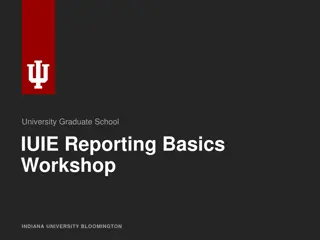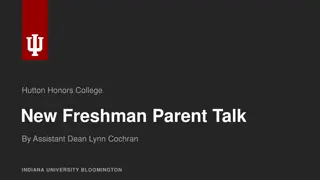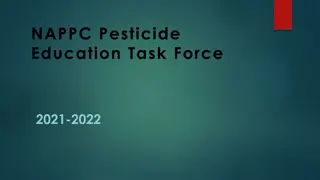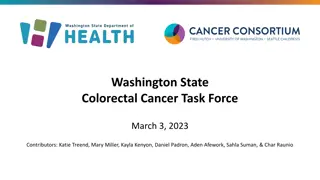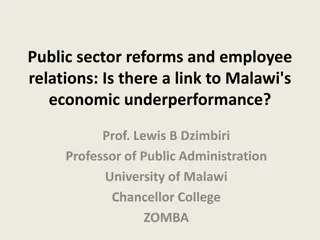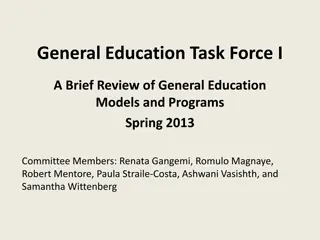Task Force Report on Future Reforms in General Education at Bloomington
The Task Force Steering Committee at Bloomington has been assessing and reporting on the future of general education, aiming to recommend evolutionary changes in requirements and structure without the need for additional credits or courses. Various inputs such as archival documents, best practices reports, online materials, surveys, interviews, and discussions have been considered in proposing reforms centered on the theme of "Learning Together." The primary focus is on bringing faculty and students together, incorporating peer reviews, interdisciplinary approaches, and a capstone experience.
Download Presentation

Please find below an Image/Link to download the presentation.
The content on the website is provided AS IS for your information and personal use only. It may not be sold, licensed, or shared on other websites without obtaining consent from the author.If you encounter any issues during the download, it is possible that the publisher has removed the file from their server.
You are allowed to download the files provided on this website for personal or commercial use, subject to the condition that they are used lawfully. All files are the property of their respective owners.
The content on the website is provided AS IS for your information and personal use only. It may not be sold, licensed, or shared on other websites without obtaining consent from the author.
E N D
Presentation Transcript
3rd Century Gen Ed Report to the Bloomington Faculty Council December 6, 2022
Task Force Steering Committee John Arthos, English (COAS) J Duncan, Informatics (Luddy School) Clark Barwick, Communication, Professional & Computer Skills (Kelley School) Micol Seigel, American Studies and History (COAS)
Task Force Steering Committee Constituted April 3 2019 by the BFC Executive Committee: "The principal objective of the task force is to assess and report on the future of general education on the Bloomington campus, making recommendations for evolutionary changes in its requirements and structure for adoption and implementation. It is expected that the task force will recommend revisions of BFC policies related to the scope, requirements, and implementation of this integral aspect of the undergraduate curriculum designed to build lifelong learning skills. "
High-level Overview and Primary Concern Proposed Reforms have a single theme: LEARNING TOGETHER Bring faculty together: Bring students together: Peer Review across Gen Ed topics First-year Experience Annual Colloquium for Gen Ed Courses across units Interdisciplinary research and teaching Capstone Experience Proposed Reforms DO NOT require any additional credits or courses, although units can choose to add credits or courses, as they can currently.
Task Force - Input Archival documents about the creation of Gen Ed at IUB Best Practices Reports (American Association of Colleges, Association of American Colleges and Universities, Teagle Foundation, The Journal of General Education, The Journal of Liberal Education, and the 2018 Chronicle of Higher Education Handbook on Gen Ed Reform) Online Materials (Harvard, Virginia Tech, Depauw, Purdue, IUPUI, UCLA, Ohio State University, Clemson, Colorado State University, University of Virginia, etc.) Town Halls for Faculty (December 2019, Spring 2021) Surveys (Undergraduates, Undergraduate Advisors) Interviews (Ursinus College, Concordia University, Boston College 2020) Discussions with Administration (Dennis Groth (2019, 2020), Paul Gutjahr (2020), Kurt Zorn & Michael Lundell (2021), Rahul Shrivastav (2022)) Discussions with individual faculty members in many departments Feedback from every school or unit on campus that teaches Gen Ed through the Liaison Committee
Task Force - Output Subcommittees at IUB (30 40 faculty across units offering Gen Ed courses) Interim report to the BFC (December 2021) Current report to the BFC (December 2022) We are here! (Opportunity for engagement with comments and alteration of report) Final report to the BFC (Planned March 2023)
Analysis of Current Gen Ed We identified issues with the current implementation of Gen Ed, among them: Competition for Gen Ed credits (encouraged by RCM) Student confusion (check the boxes) / Student rejection (doesn't feel useful) Faculty confusion (how / why / what)
Criteria for Reform 1. The program should be comprehensible to students. 2. The program should feel meaningful and legitimate to students. 3. The faculty should believe and be invested in the reform proposals. 4. The program should align value and feasibility for the campus.
Overall Structure of Proposed Reform A full four-year general education framework (first-year experience, reformed distribution approach, senior capstone) as a vision for a robust third-century general education program A concrete plan to refigure the distributed Common Ground courses (an Enduring & Urgent Questions approach) immediately The strengthening of an existing themed requirement (social justice) Practical administrative changes for the smoother functioning of the current system: i.e. minimal concrete steps for fixing flaws in the current program
Implementing Proposed Reforms To stay with a 30-credit allotment for Gen Ed, we have the option of changing credits required in distribution requirements: Current GenEd Proposed innovation A&H 6 credits/2 courses 3 credits/1 course S&H 6 credits/2 courses 3 credits/1 course N&M 6 credits/2 courses 3 credits/1 course Any other course in COAS, any level (including first year experience, EUQ, or capstone courses) OR any course designated S&H, N&M, or A&H in the student s home unit or elsewhere. 9 credits/3 courses Total courses 18 credits/6 courses 18 credits/6 courses
Two Surveys 1. Sophomore-Junior Student Questionnaire (March 2021) +/- 80 2. Undergraduate Advisors Questionnaire (March 2022) +/- 400
GUIDING REFORM CRITERIA #1. The program should be comprehensible to students. #2. The program should feel meaningful and legitimate to students. #3. The faculty should believe and be invested in the reform proposals. #4. The program should align value and feasibility for the campus.
FIRST YEAR EXPERIENCE shared, meaningful ENDURING & URGENT QUESTIONS COMMON GROUND SENIOR CAPSTONE REFLECTING BACK APPLYING FORWARD
"Learning outcomes don't motivate students. Questions do." Scott Ashmon, Associate Provost, Concordia University Irvine Chronicle of Higher Education Reforming Gen Ed Handbook
Sampling of Gen Ed Task Force Interviews with Various "Enduring Questions" Creators/Admins
i202 Social Informatics Are we our technology? Discuss how computer and information technology can have different effects on different groups of people, at different times, and in different contexts. Identify how the differential effects of technology and information systems are shaped by the positionality (race, class, and gender) and power of people, groups, and institutions. Identify the affordances of computing and information systems for different people, groups, and institutions.
ENG-R210 Digital Rhetoric Are we our technology? Explore the shifts underway between traditional media and digital media Critically engage with histories and theories of digital media Analyze how digital media influence who we are, how we communicate, and how we build community in digital spaces
SPEA E183 Environment & People Students should be able to recommend alternatives to existing environmental policies How should humans interact with Earth? explain ways in which a student s/a society s actions impact the surrounding environment summarize, explain, and analyze environmental problems they encounter in the media
ENG R397 Narrative Genre Workshop demonstrate how movie genres do cultural work identify how narrative genres respond to specific cultural/historical needs and desires detail a rich example of the interaction between an historical context and a genre transformation What do the stories we tell tell us about ourselves?
EAS G308 Paleontology & Geology of Indiana How might humans interact with Earth? understand the evolutionary history of major groups of animals and plants the origins of life on land the growth of the North American continent changes to the Earth's atmosphere and oceans, and the interactions among life, climate, sediments, and geological structures.
What does it mean to be human? What is a good life? Are we our technologies? Can we model/explain the natural world? Can we predict the future? How might we live with one another? What is culture and why does it matter? What makes someone an American?
GUIDING REFORM CRITERIA #1. The program should be comprehensible to students. #2. The program should feel meaningful and legitimate to students. #3. The faculty should believe and be invested in the reform proposals. #4. The program should align value and feasibility for the campus.
FIRST YEAR EXPERIENCE ENDURING & URGENT QUESTIONS COMMON GROUND SENIOR CAPSTONE
Social Justice Education Guided by student activism in 2016 Implemented incompletely in 2019 "Diversity" less transformative than "Social justice" Intersectional approaches key
New Social Justice Curriculum Not proposing a new singular class Taught by self-selected, full-time faculty across campus Coordinated by a "Director of Social Justice Education" in OVPUE Brought into communication with each other through annual colloquia Supported through salary supplements, research and teaching funds, course releases or teaching considerations, by recognizing the significance of this service in promotion. RCM consequences must be mitigated
"Diversity in the US" vs "Social Justice Education" ADVANTAGES OF SJE PROBLEMS WITH DUS Support social justice scholarship and scholars Atomization a patchwork of courses Support innovative teaching and scholarly collaborations Shallow engagement Student resentment Achieve critical mass Save administrative labor
Institutional Adjustments Constitution of the Bloomington Faculty Faculty responsibility: legislative authority over curriculum consultative authority over other matters. Administrative responsibility: to structure the institution to support the curriculum the faculty designs. RCM must continue to shift to support Gen Ed and other teaching and research goals. RCM Task Force has not specified how this reform should go.
Nine immediate action items for BFC: 1. Replace or supplement current assessment of Gen Ed with meaningful and formative assessment, including peer review (possibly based on FACET's peer review program) and colloquia 2. Clarify and simplify explanations of current Gen Ed program to make requirements and their purposes easier to understand and less confusing to students 3. Provide additional training to advisors so they can clearly communicate purposes of Gen Ed to students and avoid checklist effect
4. Communicate to faculty the structure of Gen Ed and the place of their course(s) within it; and which programs and units are encouraging their students to take these courses 5. Improve transparency for approving Gen Ed courses by openly sharing reasons for approval or rejection 6. Task the BFC to revisit the structure of Gen Ed-related committees so that they are still well-aligned with the intent of the faculty, and that their processes are suitable and efficient
7. Enlist the Universitys communications office in a major, sustained campaign to help form student understanding of and appreciation for general education (both now and as reforms occur) 8. Encourage OVPUE and faculty directors of required multi-section Gen Ed courses to work collaboratively to address instructor supply issues 9. Allow upper-level courses to count towards Gen Ed requirements when the instructor deems appropriate
Finally, we call on the BFC to carry this work forward. The BFC Executive Committee should direct the Educational Policies Committee to constitute a follow-up Task Force to work on the implementation of the recommendations in this report. Where appropriate, Constitution and Rules Committee should advise them. This Task Force should aim to have specific policy language before the BFC in 1 year.
3rd Century Gen Ed Report to the Bloomington Faculty Council December 6, 2022
